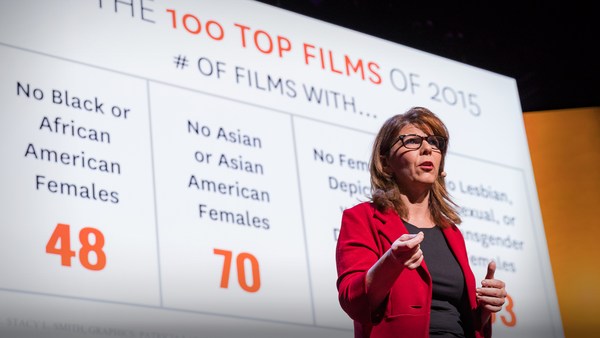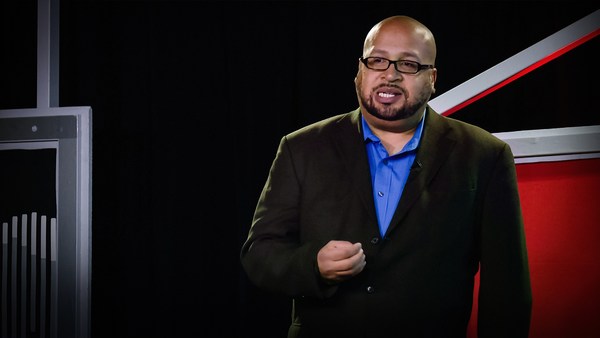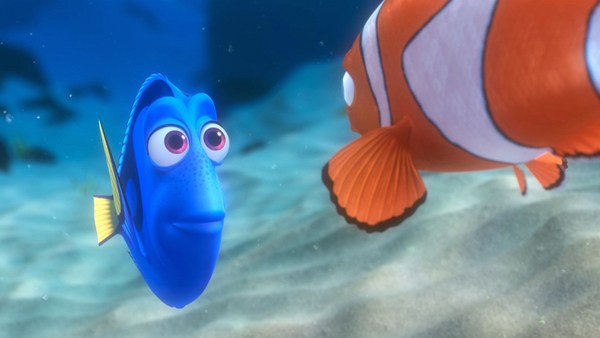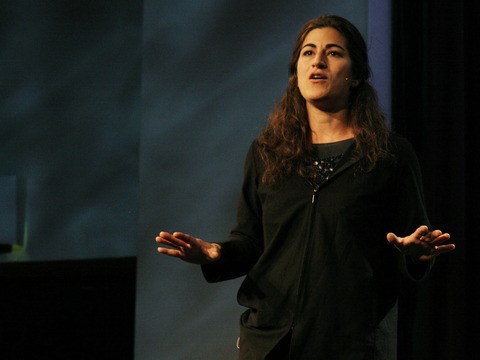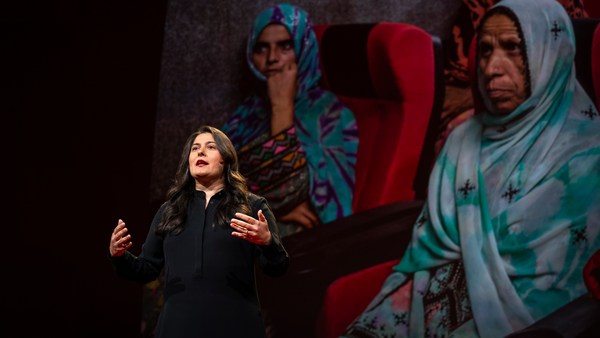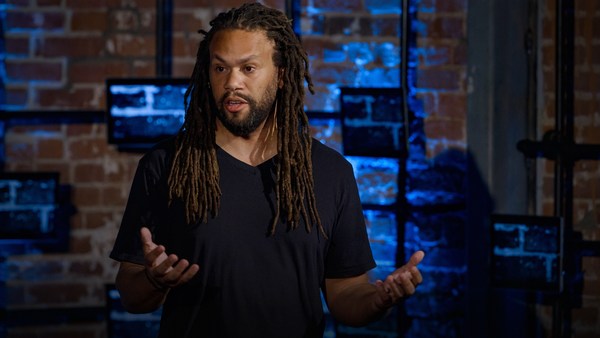I'm going to begin today with a story and end with a revolution.
(Laughter)
Are you ready?
Audience: Yes!
Naomi McDougall-Jones: Here's the story. All my life I wanted to be an actress. From the time I was very small, I could feel the magic of storytelling and I wanted to be a part of it. So, at the ripe age of 21, I graduated from the American Academy of Dramatic Arts in New York City, bright-eyed and bushy-tailed, and ready to take my rightful place as the next Meryl Streep. That's my grandmother, not Meryl Streep.
(Laughter)
Now, it's important for this story that you understand that I was raised by a raging feminist. I mean, just to give you some idea: when I was five or six years old and obsessed with "The Sound of Music," and running around, singing, "I am 16 going on 17," all day every day, my mother sat me down for a very serious conversation and she said, "OK, look. I'm not going to say that you can't sing that song, but if you are going to sing that song, I do need you to understand the extremely problematic gender construct that it reinforces."
(Laughter)
So that's where I come from. So it just honestly never even occurred to me that I would be prevented from doing anything in my life because I'm a woman.
OK. So I graduate. And I start auditioning and I get work, slowly. But I just start noticing that the parts available for women are terrible. But, remember -- I came here to play smart, willful, complicated, interesting complex, confident female characters, right? Like Meryl. And all of the sudden, I am wrestling with 300 other gorgeous, talented women to play ... "[Female] No dialogue. The character only needs to stand on a balcony, look forlorn, and walk back inside the house. Only partial nudity."
(Laughter)
"[Sarah] Brian's love interest. Attractive, cute, and flirty, she is the ideal girl and Brian's prize throughout the entire film." "[Mom] A proper Southern belle who is making peace with the fact that her only purpose in life is to tend to her husband." "[Abby] Must be OK with a tastefully shot gang rape, along with performing 19th-century dance."
(Laughter)
Those are actual casting notices. And so I just mentioned this to my agent one day, I say, "I feel like I'm not really going in for parts that I'm actually excited about playing. And he said, "Yeah. I don't really know what to do with you. You're too smart for the parts that are being written for women in their 20s, and you're not quite pretty enough to be the hot one, so I think you'll work when you're 35."
(Laughter)
And I said, "Oh. That's funny. I always thought that when you were 35, you were kind of, like, over the hill as an actress, that you were relegated to playing 20-year-olds' mothers." And he said, "Yeah --
(Laughter)
It's just the way it is."
So, maybe a year or so after this, I'm having lunch with an actress friend of mine, and we're talking about how insane this is. And we decide, you know what? No problem. We'll just make our own movie. And I'll write and then I'll write it about two complex female characters. So we do. We set out to make this movie, and sort of accidentally, we end up hiring an all-female production team: the writer, directors, producers, and it's a film about two women. And so pretty soon, we're sitting in the office of a successful male producer, and he goes, "OK, girls. So, you do understand that at some point you are going to have to hire a male producer onboard, right? Just so that people will trust you with their money." Over and over again, people tell us, "Yeah, but people don't really want to see films about women, so maybe you should think about making something else. It's just the way it is." So we make the movie, anyway. We scrape together 80,000 dollars, and we make it, and it does so well. It gets into tons of festivals and we win a lot of awards and it's big and exciting.
But these experiences I've had just keep rubbing at me. And so, I just start talking about them, first, at Q and A's after screenings of the film, and then I get invited to be on panels and talk at conferences. And the really amazing thing is that, to begin with, when I'm just talking to audiences and other people, you know, coming up in the film industry, the universal reaction is, "Oh my god! This is terrible. What do we do about this?" But the bigger panels I get on, suddenly an Oscar nominee tells me, "Look, I totally agree with everything you're saying. You just need to be really careful about where you say it." An Oscar-winning producer tells me that she doesn't think it's a good idea to play the woman card. It's just the way it is.
And I think this is how sexism continues on in 2016, right? For the most part, it happens casually -- unconsciously, even. It happens because people are just trying to get along within an existing system. It happens, maybe, out of a genuine desire to teach a young woman the way that the world "just is." The problem is that unless we do something about it, that is the way the world will always be.
So why should you care about this? Right? I mean, we're facing some rather significant problems in the world just at present, what does it really matter if I can't get a job, or you're stuck watching "Transformer 17," right?
(Laughter)
Well, let me put it to you this way: the year "Jaws" came out, Americans suddenly started listing "sharks" among their top 10 major fears. In 1995, BMW paid the James Bond franchise three million dollars to have James Bond switch from driving an Aston Martin to a BMW Z3. That one move caused so many people to go out and buy that car, that BMW made 240 million dollars in pre-sales alone. The year that "Brave" and "Hunger Games" came out, female participation in archery went up 105 percent.
(Laughter)
In fact, studies show that the movies you watch don't just affect your hobbies, they affect your career choices, your emotions, your sense of identity, your relationships, your mental health -- even your marital status.
So now, consider this: if you have watched mostly American movies in your lifetime, 95 percent of all the films you have ever seen were directed by men. Somewhere between 80 and 90 percent of all of the leading characters that you have ever seen were men. And even if we just talk about the last five years, 55 percent of the time that you have seen a woman in a movie, she was naked or scantily clad. That affects you. That affects all of us. We actually can't even imagine how much it affects us, because this is all we've ever had. Stories -- and movies are just modern stories -- are not frivolous. They're actually the mechanism through which we process our experience of being alive. They're the way that we understand the world and our place in it. They're the way we develop empathy for people who have experiences different than our own. And right now, all of that is being funneled at us through the prism of this one perspective. It's not that it's a bad perspective, but don't we deserve to hear them all? How would the world be different if all of the stories were told?
So what do we do about this? This may be the first time a lot of you are hearing about this, but a lot of us within the film industry have spent years -- a lot of people, a lot longer than I have -- giving speeches and doing panels and writing articles and doing studies, and really just yelling at Hollywood to do a better job about this. I mean, we have really yelled at them. And yet, Paramount and Fox recently released their slates, and of the 47 films that they will release between now and 2018, not a single one will be directed by a woman. So it is beginning to occur to me that waiting for Hollywood to grow a conscience may not actually be a winning strategy. In fact, it seems to me that whenever there is a small, ruling class of people who have all of the money and power and resources, they're not actually that excited about giving it up. And so you don't get change by asking them or even yelling at them. You have to make that change happen through a revolution. Now, please don't worry -- I promise you, here, now, today, our body count will be very low.
(Laughter)
So, now before I get to my four-point plan for the revolution -- yes, I have a four-point plan -- I have two pieces of very good and important news for you.
Good news number one: there are female filmmakers.
(Cheers and applause)
Yes! I know!
(Applause)
We exist! We actually graduate from film schools at the same rate that men do -- 50 percent. So here we have our 50 women. The problem is that as soon as you get to the micro-budget film, so even the very smallest films, we're already only directing 18 percent. Then you get to slightly bigger films, indies in the $1-5 million budget range, and we go down to 12 percent. So by the time you get to the studio system, we're only directing five percent of movies. Now, I know some of you out there will look at this and secretly think to yourselves, "Well, maybe women just aren't as good at directing movies." And that's not a totally insane question. I mean, we like to believe the film industry is a meritocracy, right?
(Laughs)
(Laughter)
But look at this trajectory. Either you have to accept that women are actually five percent as talented as men, which I don't, or you have to accept that there are serious systemic issues preventing us from getting from here to there. But the good news is, we exist, and there is a vast amount of untapped potential over here. Good news number two, and this is really good news: films by and about women make more money. Yes! Yes! It's true!
(Cheers and applause)
It's true. The Washington Post recently released a study showing that films that feature women make 23 cents more on every dollar than films that don't. Furthermore, my colleagues and I commissioned a study comparing 1,700 films made over the last five years and, looking at the average returns on investment -- so, how much money does that movie make -- comparing if a man or a woman filled each of the following roles: director, producer, screenwriter and lead actor. And in every single category, the return on investment is higher if it's a woman. Fact: women buy 51 percent of all movie tickets. Films by and about women make more money. And of course, at least some portion of the male population does also like women --
(Laughter)
so "women films" are not just for women. And yet, Hollywood only targets 18 percent of all of their films as "women films." So what you're left with is a giant underserved audience and untapped profit potential. So we exist, and we have stories to tell. We have so many stories to tell. And despite everything we've heard: you want to see them. The problem is, we've got this thing -- let's call it "Hollywood" --
(Laughter)
no, no, I'm just kidding; I've met some very nice people in Hollywood -- Hollywood, preventing us from getting to you. So here is my four-point plan for the revolution, and everybody -- man or woman, in this room or anywhere in the world -- is going to get to help.
And this revolution is not just for women. Anyone who has been disenfranchised, anyone whose story has not been told, the same principles apply, and I really hope we can do the revolution together.
My four-point plan. Number one: watch movies. Isn't this a good revolution?
(Laughter)
OK, first I want to talk to anyone who watches movies. Who watches movies in here? Great! Will you pledge to watch one film by a female filmmaker per month? That's it, just start there. Great! If you need help finding them, you can go to the website, moviesbyher.com It's an easily searchable database of films by women. And as you start watching all movies, I just want you to pay attention to the female characters. How many of them are there? What are they wearing? Or not? Do they get to do cool things, or are they just there to emotionally support the men? I'm telling you, once you see this, you're not going to be able to unsee it. And as you start noticing this, it's going to shift your viewing habits. And this already sizable market is going to continue to grow.
Step two: make movies. So now I'm talking to all the female filmmakers out there: we need you to be very brave. It will be harder for you to make movies. In fact, there will be an entire industry constantly telling you that your stories don't matter. And we need you to make them, anyway. That 18 percent in the micro-budget range -- that is on us to fix. Don't wait for permission. Don't wait for somebody to pick you, because 95 percent says they are not going to. Crowd fund. Write letters to eccentric relatives. I know how hard it is, but you have to make your movies -- now, today, features, not shorts. There is an audience for them, and they want and need to see them.
Three: invest in each other. Fellow female filmmakers, I feel like we need to stop wasting so much energy on a system that does not want us. We need to find our audience and invest in cultivating them. If we can figure out how to make our movies and deliver them to the audiences that want them, that's it. That's the whole game. And whatever they're doing in the middle is going to cease to be quite so important. Audiences, invest in us. Help us make the movies that you want to see. If you can give a female filmmaker 25 dollars in a crowdfunding campaign, great, do that. If you can invest more seriously and help us over that critical million-dollar hurdle, do that. But invest in seeing the other half of the story.
Four: disrupt through business. So now I'm talking to all of the businesspeople and entrepreneurs. This does not happen very often in the world, but right here we have a golden situation in which you can enact significant social change while also making money. Hollywood is a system ripe for disruption. The old models of financing and distribution are crumbling -- please come in and disrupt it. I'll give you an example. Right now, with some incredible women, I am launching the "The 51 Fund." It's a venture capital fund that will finance films written, directed and produced by women in that critical $1-5 million range. We will give a significant number of female filmmakers the chance to make their movies and we will deliver them to the audiences who want them. Good for equality, good for business. But that's only one example, we need more. There is room for so many more. So I say to you: Hollywood is leaving money on the table. Come pick it up.
(Applause)
Now, all of this may seem like a lot, but it is actually so doable. Entrenched systems don't change because you ask the people in charge, they change because all of the people who don't have what they want rise up and make that change happen. And don't you want to? I want to see what the other 51 percent of the population has to say. I want to watch movies that teach me about people who are different than I am. I want to see women's bodies on film that aren't perfect. I want to give our little boys the chance to empathize with female characters so that they can become more whole men. And I definitely want to give a little girl who may not have a real-life role model the chance to watch movies and see women doing everything she dreams of achieving.
This is not about making one industry better. This is about making a better world. Will you help? The time for waiting is over. The time for the revolution is now.
(Cheers and applause)
